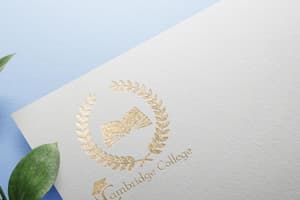Podcast
Questions and Answers
Which sentence demonstrates the correct use of a gerund?
Which sentence demonstrates the correct use of a gerund?
- She likes to swim every morning.
- We hate to cleaned the kitchen.
- He enjoys playing the guitar in his free time. (correct)
- They are enjoy to play football.
Which option correctly uses 'can' to express ability?
Which option correctly uses 'can' to express ability?
- He can speaks three languages fluently.
- She can play the piano beautifully. (correct)
- I can to singing very well.
- They can to be at the party tonight.
Which of the following questions is correctly structured as a 'Wh-' question?
Which of the following questions is correctly structured as a 'Wh-' question?
- Why you are sad?
- Do you like ice cream?
- Where is the library located? (correct)
- Are you going to the party?
Which sentence correctly uses the present simple tense to describe a routine?
Which sentence correctly uses the present simple tense to describe a routine?
Select the sentence in which the verb 'to be' is used correctly.
Select the sentence in which the verb 'to be' is used correctly.
Which sentence best exemplifies the use of a gerund after 'start'?
Which sentence best exemplifies the use of a gerund after 'start'?
Which question is correctly formed using a 'Wh-' word and the verb 'to be'?
Which question is correctly formed using a 'Wh-' word and the verb 'to be'?
Which of the following sentences correctly demonstrates the use of the present simple tense with an adverb of frequency?
Which of the following sentences correctly demonstrates the use of the present simple tense with an adverb of frequency?
Which sentence correctly contrasts the use of the present simple and a gerund to describe an activity?
Which sentence correctly contrasts the use of the present simple and a gerund to describe an activity?
Which sentence uses the present simple form of 'to be' correctly to describe a characteristic?
Which sentence uses the present simple form of 'to be' correctly to describe a characteristic?
Flashcards
Present Simple
Present Simple
Used to describe habits, routines, general truths, and states of being.
Forming Present Simple
Forming Present Simple
Base form of the verb for most subjects, -s or -es for third-person singular.
Usage of Verb + -ing
Usage of Verb + -ing
Used as a noun, often acts as the subject or object of a verb.
Common Verbs with -ing
Common Verbs with -ing
Signup and view all the flashcards
To Be Forms
To Be Forms
Signup and view all the flashcards
Usage of Can
Usage of Can
Signup and view all the flashcards
Wh-Questions
Wh-Questions
Signup and view all the flashcards
Forming Wh-Questions
Forming Wh-Questions
Signup and view all the flashcards
Present Simple vs. Gerund
Present Simple vs. Gerund
Signup and view all the flashcards
Adverbs of Frequency in Present Simple
Adverbs of Frequency in Present Simple
Signup and view all the flashcards
Study Notes
Present Simple
- Used to describe habits, routines, general truths, and states of being.
- Formed by using the base form of the verb for most subjects (I, you, we, they) and adding -s or -es to the verb for third-person singular subjects (he, she, it).
- Example: I eat breakfast every morning. He goes to school every day.
Verb + -ing (Gerund)
- Used as a noun, often acting as the subject or object of a verb.
- The -ing form is commonly used after verbs like enjoy, like, love, hate, prefer, start, stop, continue, etc.
- Example: I enjoy playing tennis. She hates cleaning the house. He started studying English last year.
To Be
- Used to express existence, state, or location, as well as to describe a person's or thing's characteristics.
- Has three forms: am, is, are.
- Example: I am happy. You are a student.
Can
- Used to express ability or the possibility of something happening.
- Example: I can swim. We can go to the park today.
Wh-Questions
- Questions that begin with words like who, what, when, where, why, which, and how.
- Examples:
- Who is the teacher?
- What are you doing?
- When does the train leave?
- Where do you live?
- Why are you late?
- Which colour do you like best?
- How do you get to work?
Tense Comparison - Present Simple and Gerund
- Present Simple describes habits and routines (ongoing action or state): He walks to school every day.
- Verb + -ing describes an ongoing activity as part of a larger action or a general tendency: He enjoys walking to school.
Additional Notes on Present Simple
- Regular verbs: follow the standard rules for adding -s or -es in the third person.
- Irregular verbs: have unique forms in the third person, and need to be memorized.
- The present simple form is used with adverbs of frequency (always, often, usually, sometimes, rarely, never, etc.) to describe habitual events.
Additional Notes on Wh-Questions
- Wh-questions are used to ask for specific information.
- When forming wh-questions with the verb 'to be', the verb should be placed directly after the wh-word.
- Wh-questions typically require a specific, detailed answer, whereas yes/no questions require a simple "yes" or "no" as an answer.
Studying That Suits You
Use AI to generate personalized quizzes and flashcards to suit your learning preferences.




